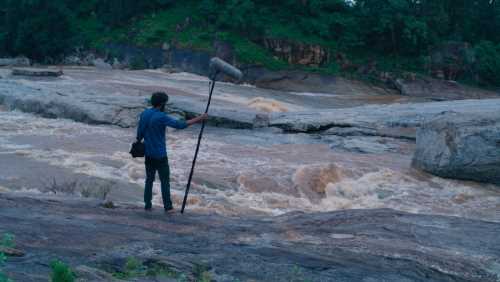
The mystical and the industrial cross paths in this haunting debut from India, screening at this year’s Locarno Film Festival in the event’s parallel competition for first and second movies. It begins in an almost documentary style, showing the harsh, eerie beauty of Jharia, a once-proud mining community that’s now an apocalyptic ruin of a city, where toxic waste is dumped 24/7 and noxious fires burn just as endlessly. Midway through, however, Lubdhak Chatterjee’s film begins to change direction, as its passive hero becomes attuned to the natural mysteries lurking in the adjacent woods.
The set-up is a clear-cut juxtaposition of ancient and modern, as sound artist Shiva (Sagnik Mukherjee) arrives in Jharia with a boom mic and recording apparatus to find material for use in an art installation back home in Kolkata. At first these are simply ambient sounds, like kids playing football or, more ominously, the clattering of collapsing coal deposits. But sound and image start to become unmoored, the first sign that something strange is about to happen that will undercut the social realism.
Related Stories

Dominican Pic 'Tres Balas' About Spain's First Official Hate Crime Dominates Locarno's Open Door Awards

Climate Change Activists Interrupt Locarno Piazza Grande Screening Of Luc Jacquet's South Pole Doc 'Magnetic Continent'
Shiva meets a lot of local people on his journey, notably a professor who spends his time there in the vain of hope of educating the populace out of poverty. He also meets the local policeman, who is initially amused by Shiva’s high-falutin’ profession (“How did you discover art in this hell of a graveyard?” he scoffs). The policeman brings with him some news about the outside environs: Jharia is a violent place where gunfights are commonplace, and he warns Shiva not to walk anywhere unaccompanied.
This is where Whispers of Fire & Water enters a whole new realm, starting with a curiously jarring March of Time-style newsreel that tells ‘The Story of Shining India’, depicting the false optimism of the country’s late-blooming industrial revolution. After that interlude, Shiva encounters an angry female journalist from Mumbai, who confronts a complacent rep from the local mining company, telling him “either there are actions or excuses”. And then, most extraordinary of all, Shiva interviews a local elder who talks of a mysterious “tree of knowledge” and reveals that every year a bunch of townspeople go missing.
At this point the detective reappears, visiting Shiva in his crummy boarding house. Bizarrely, we don’t see him for a while; Chatterjee focuses on Shiva’s expressionless face as the policeman invades his space, making strange drumming sounds with his fingers. There has been a murder in the area, and Shiva may have been an unwitting witness, but the policeman — drunk and swigging from a small bottle of alcohol — seems to be fingering him as a suspect, behaving so bizarrely that the scene ends with a disquieting jump scare, signifying an abrupt end to the film’s first half.
From here, the film enters what could loosely be termed mild folk-horror territory, as Shiva ventures deeper and deeper into the woods, where gunshots seem to mingle with the Lynchian soundtrack of nature in the wild. It’s an interesting segue, leaving the realism of “civilized” Jharia for something mystical as Shiva appears to hear the siren call that lured away so many villagers and drifts away from reason, finally abandoning his recording tools and thus surrendering his shield as an artist.
What this all means is not precisely clear, and the accumulation of so many ambiguities leads to a low-key payoff that at least doesn’t spring a tidy resolution on us. It’s eco thoughts, however, are oddly lucid, and handled in a surprising visual style, one more closely associated with psychedelic genre movies such as Shane Carruth’s Upstream Color, Ben Wheatley’s In the Earth, Lorcan Finnegan’s Without Name and, for its use of sound alone, Peter Strickland’s Berberian Sound Studio. Kenneth Cyrus’s superb cinematography has a lot to do with this, alternating dream- and hellscapes with a unifying fluidity, but, with his very first movie, Chatterjee shows great promise as a director with ambition, intelligence and vision.
Title: Whispers of Fire & Water
Festival: Locarno (Concorso Cineasti del presente)
Director/screenwriter: Lubdhak Chatterjee
Cast: Sagnik Mukherjee, Amit Saha, Rohini Chatterjee, Saikat Chatterjee, Deepak Halder
Running time: 1hr 23 min
Sales agent: Little Lamb Films/Niv
Must Read Stories
How C2 Motion Picture Group Is Putting $100M+ Into Paramount Tentpoles
Revered UK Drama Schools Hit With 100 Misconduct Complaints
Sky Loses UK Coverage Of LA Award Ceremony After Two Decades
Q2 Beats Street Estimates; Ari Emanuel On Strikes; Update On WWE-UFC Merger
Read More About:
Source: Read Full Article



